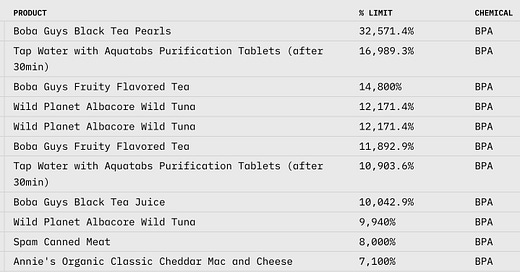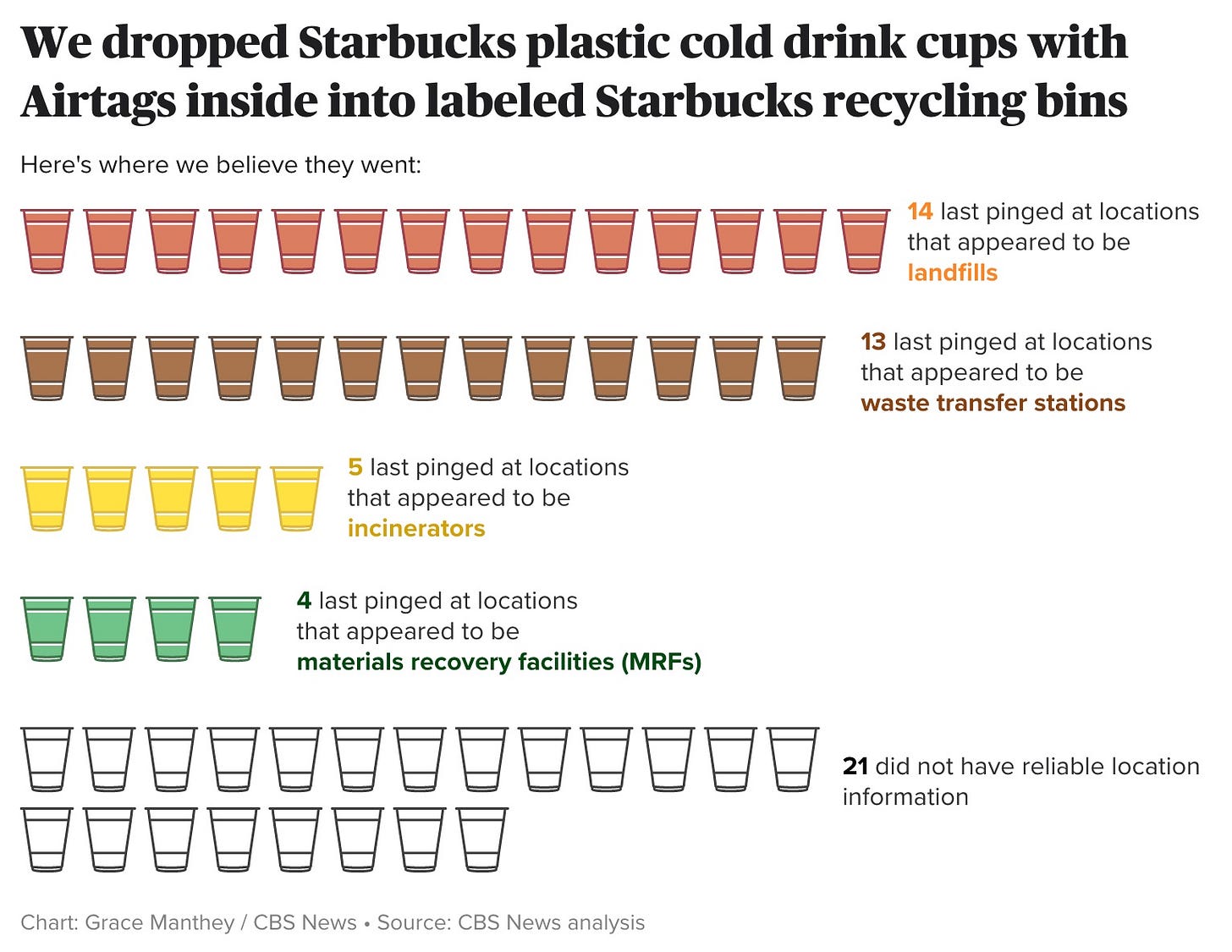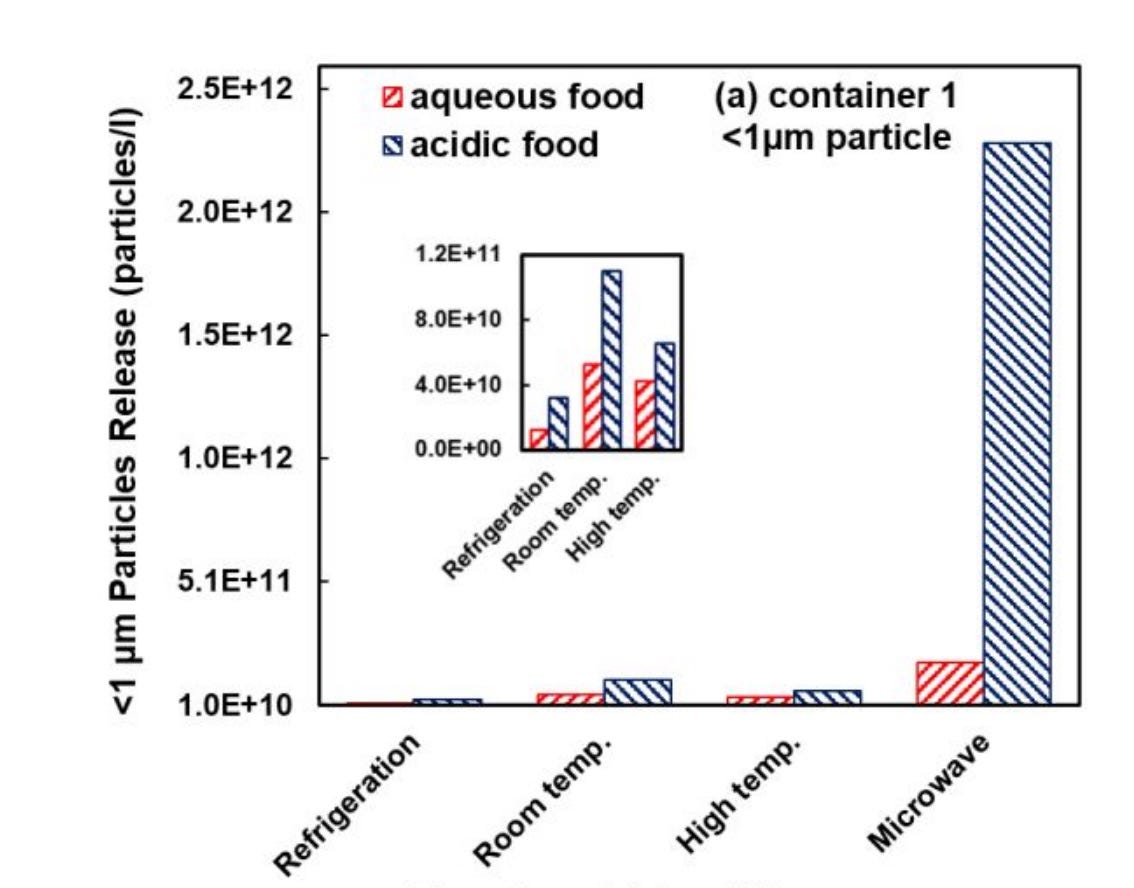Personal Science Week - 250102 Plastic
Testing your environment for plastics and what to do about it
Plastics are everywhere in modern society, and there is a growing interest in the effects they might have on our health.
This week we summarize a recent effort to quantify the level of plastics we ingest, plus other plastic-related news of interest to personal scientists.
We discussed Nat Friedman’s Plastic List crowdsourced plastic testing project in PSWeek 240613, and now the project has released its results: “plastic chemicals in 86% of all foods, with phthalates in 73% of the tested products and bisphenols in 22%. It's everywhere”. Although the vast majority of products fall within safe limits, some of the worst offenders look truly awful: one Boba Tea equals 1.2 years of safe BPA consumption, according to the European Food Safety Authority (EFSA)
Their website includes all the details, including a DIY section with recommendations for how to do your own testing: Light Labs for food testing (prices range from $100-$200 for tap water, and on up for just about anything, including cannabis and more). They also recommend Million Marker, which sells a “Detect and Detox” kit for about $300.
Many other plastic products are understudied, including oral health devices like orthodontic retainers. You can donate to an initiative by Million Marker to study oral hygiene devices like Invisalign and others, to ensure needed transparency for something that many of us wear close to our bodies for many hours every day.
Plastic Recycling
Incidentally, what doesn’t go into your body might not even go where you’d hoped. CBS News investigators glued Airtags to 34 plastic cups tossed into Starbucks recycling bins and then tracked where they went.
The results are similar to another Airtags and Recycling experiment we discussed back in PSWeek 241114
Don’t Microwave Plastic
Avoid plastic when microwaving (or long-term storing) food, but if you absolutely must use plastic, then go for types 2 and 5. Even the “baby safe” stuff releases tons of particles when exposed to microwave heat:
Read more at Bon Appetit Definitely Do Not Put Plastic in the Microwave
Polyester Plastics
Another big source of microplastics is your clothing, with polyester fleece the worst offender. During laundering, a fleece jacket can release as many as 250,000 microfibers, equivalent to the plastic in up to 11,900 grocery bags. A kilogram of polyester fleece can release up to 4.5 million fibers in a single wash. Patagonia, one of the originators of these jackets, commissioned a 2016 study that concluded their own clothing was a major cause of microplastics in municipal water supplies. Bottom line: avoid the stuff if possible, or be sure to handwash your polyester fleece clothing.
Make Testing Legal Again
The long-term affects of plastics are unclear, but at least today it’s legal to find a lab that will test them for you. That’s no longer true for the lab-developed tests that many of us personal scientists have been using for years.
I hope the new RFKjr-influenced administration will move quickly to overturn the Biden-Harris Administration’s last-minute rule change that made lab-developed tests illegal. Okay, not illegal—labs can always go through the FDA’s lengthy and onerous approval process. But smaller labs doing more speculative diagnostics won’t be allowed to release their tests to normal people. If this stands, say goodbye to lots of the non-standard genomics, microbiome and other diagnostics that make up about half of all commercial tests. Would you like to be tested for the new emerging strain of bird flu? The Biden-Harris rule makes that all but impossible.
At first glance, the new rule seems reasonable: tests should do what the lab says they'll do. But the kind of person who orders a lab-developed test is looking for something that, by definition, isn’t (yet) available from the big labs. Who knows more about whether the test is appropriate for my situation: FDA, or me? If the test is illegal, nobody will ever know if the test would have helped or not. Asking the lab to go through a special, expensive approval process just makes it unlikely they’ll offer the test at all.
Fortunately, the new administration will have plenty of options to toss this rule. Good riddance.
About Personal Science
Personal Scientists are skeptical about everything. It’s in our motto: Nullius in verba, the 1660 motto of the Royal Society: “take nobody’s word for it.”
Our newsletter is published each Thursday. If you have other topics that interest you, let us know.






One of my NY resolutions is to keep decreasing my contact with plastics. I opted for glass and metal food storage long ago, and try to avoid synthetic clothing. It seems from reviewing the plasticlist that eating lower on the food chain (whole food plant based and avoiding ultra processed foods) goes a long way to mitigating exposures. I understand that emptying your dryer lint screen could be hazardous after dryiing polyester/plastic clothing as you inhale nanoparticles that are collected in the lint. I try to put on a mask when I do so....and put in the trash outdoors straight away. Its so insidious!
This Substack post is IMHO the best summary of the PlasticList report, (and Trevor Klee is doing other interesting Personal Science-adjacent work…)
https://open.substack.com/pub/trevorklee/p/a-brief-analysis-of-the-plasticlist
tldr: PlasticList is a good start but just scratches the surface. It does seem that eating lower on the food chain and more Whole Foods might be better….